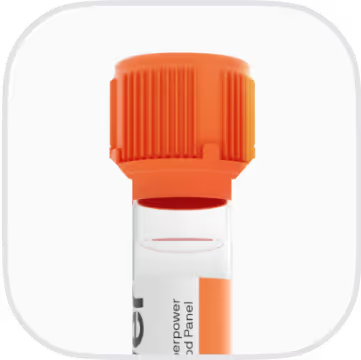What are Hyperprolactinemia biomarkers
Hyperprolactinemia biomarkers are blood signals that show how much the body is exposed to prolactin and how that signal ripples through other hormone systems. The anchor marker is prolactin itself, a milk‑promoting hormone made by lactotroph cells in the pituitary (prolactin, PRL). Prolactin interacts with the brain’s reproductive control center, so testing often adds downstream reproductive markers to capture its effects on that axis (gonadotropin‑releasing hormone, GnRH; luteinizing hormone, LH; follicle‑stimulating hormone, FSH; estradiol or testosterone). Context markers help reveal why prolactin may be high or whether it is part of a normal state: thyroid function tests reflect a common hormonal driver (thyroid‑stimulating hormone, TSH; free thyroxine, free T4), and the pregnancy hormone clarifies physiological lactation signaling (human chorionic gonadotropin, hCG). Kidney and liver biomarkers can indicate reduced clearance that amplifies circulating prolactin. Together, these measurements confirm an elevated prolactin signal and map its impact on fertility, menstrual patterns, sexual health, and lactation physiology, while pointing toward its source within the pituitary–hypothalamic network.
Why is blood testing for Hyperprolactinemia important?
- Spot high prolactin causing hormone imbalance and hyperprolactinemia.
- Explain irregular periods, infertility, or unexpected milk leakage with elevated prolactin.
- Clarify low libido, erectile issues, or low testosterone in men with elevation.
- Guide pituitary checks; very high levels suggest a prolactin-secreting tumor.
- Protect fertility and pregnancy planning by correcting prolactin-related ovulation issues.
- Identify secondary causes like medications or hypothyroidism that raise prolactin.
- Track treatment response to dopamine agonists or medication changes over time.
- Avoid misclassification by checking macroprolactin, a benign big-prolactin variant.
What insights will I get?
Hyperprolactinemia blood testing provides insight into how well your body regulates hormone balance, which is essential for reproductive health, energy levels, and even aspects of mood and metabolism. At Superpower, we measure the biomarker prolactin to assess for hyperprolactinemia—an elevated level of this hormone in the blood. Understanding prolactin levels helps us see how your endocrine system is functioning as a whole, since disruptions can affect multiple body systems, from fertility to bone health.
Prolactin is a hormone produced by the pituitary gland, primarily known for its role in stimulating breast development and milk production. In the context of hyperprolactinemia, prolactin levels are higher than what is considered normal. This elevation can signal changes in the pituitary gland, stress responses, or other underlying conditions that may impact hormone regulation throughout the body.
Stable and healthy prolactin levels support reproductive function, maintain normal menstrual cycles in women, and help regulate testosterone in men. When prolactin is elevated, it can disrupt these processes, leading to symptoms such as irregular periods, infertility, or changes in libido. Prolactin also interacts with other hormones and neurotransmitters, so imbalances can influence mood, metabolism, and even immune function.
It’s important to note that prolactin levels can be influenced by several factors, including pregnancy, breastfeeding, certain medications, stress, and even the time of day the test is performed. Some medical conditions and laboratory assay differences can also affect results, so interpretation always considers these contextual factors.







.avif)



.svg)





.svg)


.svg)


.svg)

.avif)
.svg)










.avif)
.avif)
.avif)


.avif)
.avif)




.svg)




.avif)


